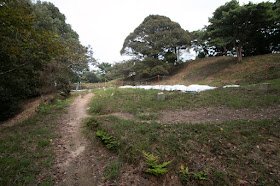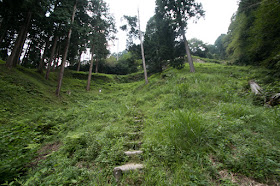Onojo Castle
-Fortress complex protected vice capital of ancient Japan-
 Overview
Overview
Name: Onojo castle (Ono-jo)
Alias: Ono-no-ki
Place: Shiouji Umi town, Fukuoka
Location: 33.54027523169193, 130.52136616592875
Type: Mountain Castle
Built: 7th century
Remaining remnants: Stone walls and clay walls
Title: 100 famous Japanese castles
Onojyo castle (大野城) spreads over whole part of Shiouji-yama mountain, one of about 400 meter height in Onojyo city, at the southeast of current Fukuoka city. Shiouji-yama mountain is a large size independent mountain of 3 kilometer diameter, and has four peaks such as Okiyama, Iwaya-yama, Mizugame-yama and Ohara-yama. Among these peaks, later Iwaya-yama peak was used as an independent castle (Iwaya castle) in 16th century.
Type: Mountain Castle
Built: 7th century
Remaining remnants: Stone walls and clay walls
Title: 100 famous Japanese castles
Brief History
Onojyo castle (大野城) spreads over whole part of Shiouji-yama mountain, one of about 400 meter height in Onojyo city, at the southeast of current Fukuoka city. Shiouji-yama mountain is a large size independent mountain of 3 kilometer diameter, and has four peaks such as Okiyama, Iwaya-yama, Mizugame-yama and Ohara-yama. Among these peaks, later Iwaya-yama peak was used as an independent castle (Iwaya castle) in 16th century.
Important role of Fukuoka area
From ancient era, current Fukuoka area was a vital area as a place of communication with other East Asian country such as China or Korea, to accept authority or advanced technology of continent. An ancient gold stamp given by Chinese Han dynasty to Na country which might exist current Fukuoka area was excavated at Shikano-shima near Fukuoka city, and this clearly shows the importance of this area.
In 6th century, after the suppression of the rebellion of local lord Iwai, Yamato dynasty directly managed Fukuoka area and established local administrative office named Chikushikan at the current place of Fukuoka castle in Fukuoka city. This organization treated the administration and defense of Kyushu island and diplomacy with foreign countries. It had a strong authority and called as “distant government”.
Tension with neighboring countries
But in 663, an alliance army of Yamato dynasty and former Korean Beakje kingdom ruined in 660 suffered severe defeat by alliance of Korean Silla kingdom and Chinese Tang dynasty at the battle of Baekgang, which occurred at the mouth of Geum river in southwest part of Korian peninsula. Yamato dynasty lost many soldiers and ships, and had to seriously consider the possibility of attack to Western Japan. Under such situation, Yamato dynasty decided to move its local government at the coast of Shizuoka city to inland area, and guard it by surrounding fort.
Opportunely Baekgang kingdom was extinguished and many refugees including castle engineers came to Japan, Yamato dynasty build many Chosun style mountains castles such as Kenetanoki castle (Nagasaki prefecture), Kinojyo castle (Okayama prefecture), Yashima castle (Kagawa prefecture) and Takayasuyama castle (Osaka prefecture) around north part of Kyushu island and coast of Setonaikai sea, expected invasion rate by foreign country to the capital using coast fleet.Yamato dynasty also placed defense troops named “Sakimori” at coast and islands of Western Japan.
Once the local government base was attacked, considering slow moving speed of ancient army, local army had to stand several mouths to wait for reinforcement. Actually when Fukuoka area was attacked by Chinese Yuan dynasty in 1274 and 1281, it took over one month for the reinforcement of Kamakura Shogunate to arrive at Kyushu island, and actual battle had finished before the arrival of this reinforcement. To protect the civilians and soldiers for several months from the attack of foreign army, Yamato dynasty needed large base at north part of Kyushu region, and Ono castle and surrounding castles were built for that purpose.
Construction of Dazaifu city
Around 660’s, Yamato dynasty built Dazaifu city, a vice capital manages Kyushu island at current Dazaifu city and moved the function from Chikushikan. Dazaifu area is roughly a narrow flat land of three kilometer wide and 10 kilometer long spreads northwest to southeast, and surrounded by mountains at north side and south side. This area is also watershed of Mikasagagawa river or Nakagawa river flow toward northwest to Fukuoka city, and river system of Chikugogawa river flew to southwestward toward Ariake sea. It was a place having good transportation and security, and suitable place to build a secure city.
The center of Dazaifu city located at the south hillside of Shioujiyama mountain, where Ono castle exists. It is thought that main part of Dazaifu city spread over a narrow rectangle shaped land of 2 kilometer long and 500 meter width between the mountain and river. City area spread toward southward, and total size of the city was about 2 kilometer long square. Many buildings such as government offices, schools, armories, warehouses, official residences and barracks were built, and many temples and shrines were built surrounding the city.
Dazaifu city was securely guarded by surrounding castles and forts. Ono castle, the largest one, was built at Shioujiyama mountain just the north of Dazaifu city. It was built to watch the north side of the city, and also worked as an evacuation place in case of necessity. On the other hand, at the south side of Dazaifu city, Kiijyo castle at the south west of Dazaifu city and Miyajidake castle at the southeast were constructed to prevent the attack from southward though Ariakekai sea.
In addition to this, to shut the front side of this narrow area from northwest ward, an expected attack front of the enemy, Mizuki fort which is a two kilometer long defense line consist of 10 meter tall clay wall and over 50 meter wide water moat were placed. Considering the shape of terrain there might be defense facilities at the mountains in northwest ward of Dazaifu city, but no ruin is found until now. Anyway Dazaifu area is a secure fortress complex and different from central capitals such as Nara or Kyoto. Later major local lords such as Ouchi clan, Imagawa clan or Takeda clan built their capital such as Yamaguchi city, Kofu city or Sunpu city guarded by surrounding castles, and the structure of Dazaifu is more closer to these cities but far larger.
Structure of Ono castle
Shoujiyama mountain where Ono castle exists is a one locate at the south of current Fukuoka airport. The height of the mountain is about 400 meter, and diameter of mountain body is about four kilometer. This mountain is a part of mountainous area spread along the east of Fukuoka city, but almost separated from backside mountain and virtually an isolated one.This mountain has a U shaped ridge toward the north, and a river flew toward the north from the hollow at the center of the mountain.
Ono castle uses the whole body of Shioujiyama mountain and built defense wall along the ridge of the mountain. Generally the ridge is shaped into a narrow line and outer side of the line became a sheer clay wall. Inside the clay walls flat terraces are made, and over 70 barracks or warehouses were built at these terraces. There area several paths from hillside, and main entrance at the south front from Dazaifu city was built at the small valley and guarded by stone walls.
A valley spread toward north from the center of the mountain was the weak point of the castle. At the crossing point of castle wall and this valley there might be a secure gate, and a long line of stone wall named “Hyakkenn Ishigaki” was built along the wall to prevent the enemy to climb to the wall. Partially being lost by collapse, but main part of this stone wall of xx meter height still remains along the slope. The total length of the wall exceeded 8 kilometer, and Ono castle was a huge castle built with all strength of Yamato dynasty.
This style of ancient mountain castle is called as “Chosenshiki Yamajiro” (Chusun style mountain castle), and different from Japanese style mountain castles. Chosun style mountain castle is usually built a table mountain style mountain with large hilltop area, and a single layer and vertical wall surrounded whole part of hilltop area. Contrary to this, Japanese style mountain castles are usually built on a narrow ridge, and had several layer walls only toward the connecting ridge from outside.
Chosun style castle had a large inner space and is suitable for endurance battle between large but primitive armies with civilians. The aim of the castle is to avoid actual battle and barricaded inside the castle. On the other hand, Japanese style mountains castle expects retrograde combat and counter attack using the narrow and layered areas of the castle between skilled army.
Afterward of Dazaifu city and Ono castle
Dazaifu city prospered as a political center of Western Japan by 11th century. After 10th century Sometimes Dazaifu city was involved in the domestic rebellion or foreign assault, but there was no severe landing of enemy to Fukuoka area as expected. In 901, famous noble Michizane Sugawara (845-903) who was involved in political conflict with Fujiwara clan was relegated to the secretary of Dazaifu but shortly died in the ill with grunge. To sooth the spirit of Michizane, a shrine named Dazaifu Tenmangu was built near the Dazaifu city, and later this shrine became adored as a god of studies.
Subsequent to 12th century, due to the growth of foreign trade and centralization of government, the importance of Dazaifu decreased. Dazaifu gradually desolated, and Ono castle was also abandoned. At the time of Genko, an invasion of Chinese Yuan (Mongolian) empire to Japan, Japan side thought to utilize Ono castle or Mizuki fort in case of necessity, but Mongolian army was drove back at seaside and Ono castle was not used as a result.
Now the site of Ono castle became a historical park, and clay walls and stone walls remains here and there in mountains. Due to its huge size it is difficult to grasp the overview of the castle, but endlessly continuing winding clay walls well shows huge impact of international tension of 7th century.
Related Castles
Kinojyo Castle -Mysterious ancient mountain castle connected with famous tale-
Tagajyo Castle -Vice capital of ancient Japan in fortress city-
Iwaya Castle -Heroic death of brave general-





















































































































































































No comments:
Post a Comment